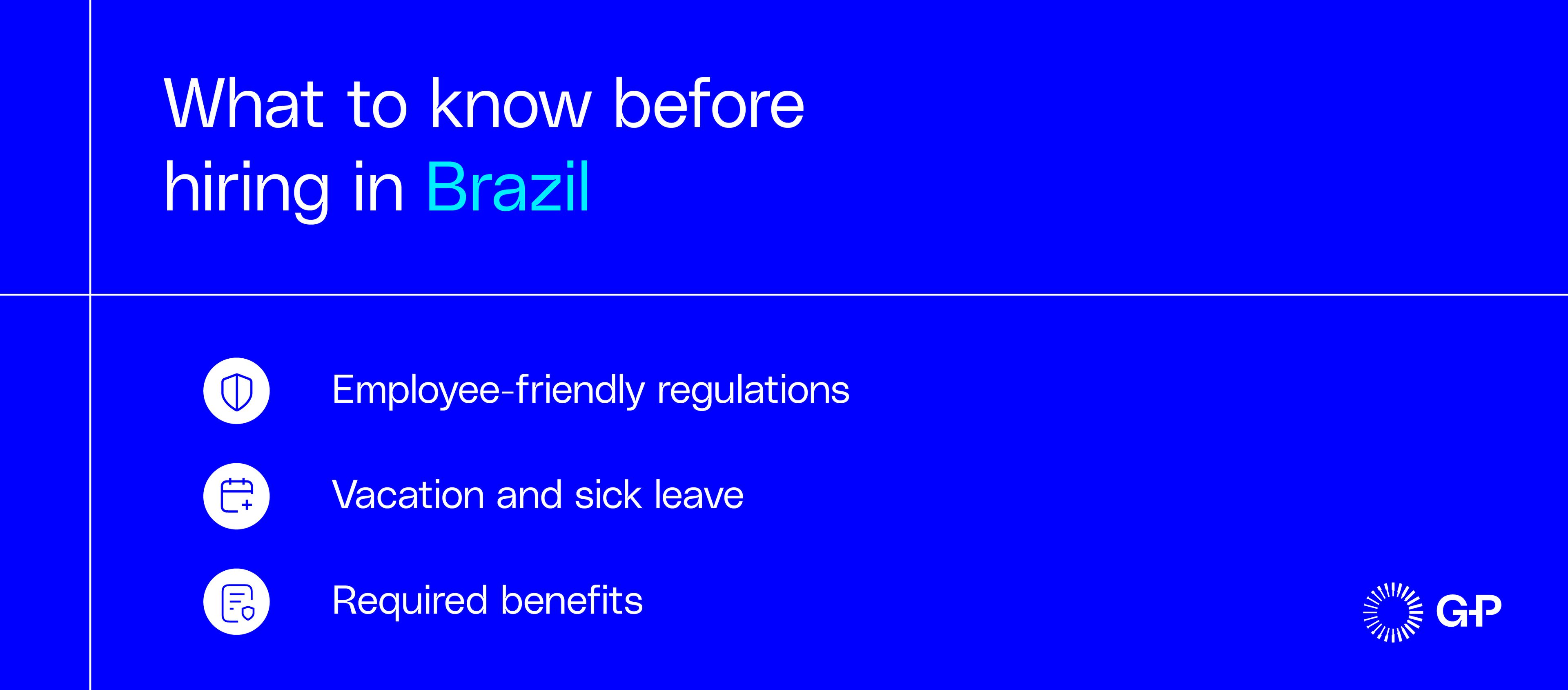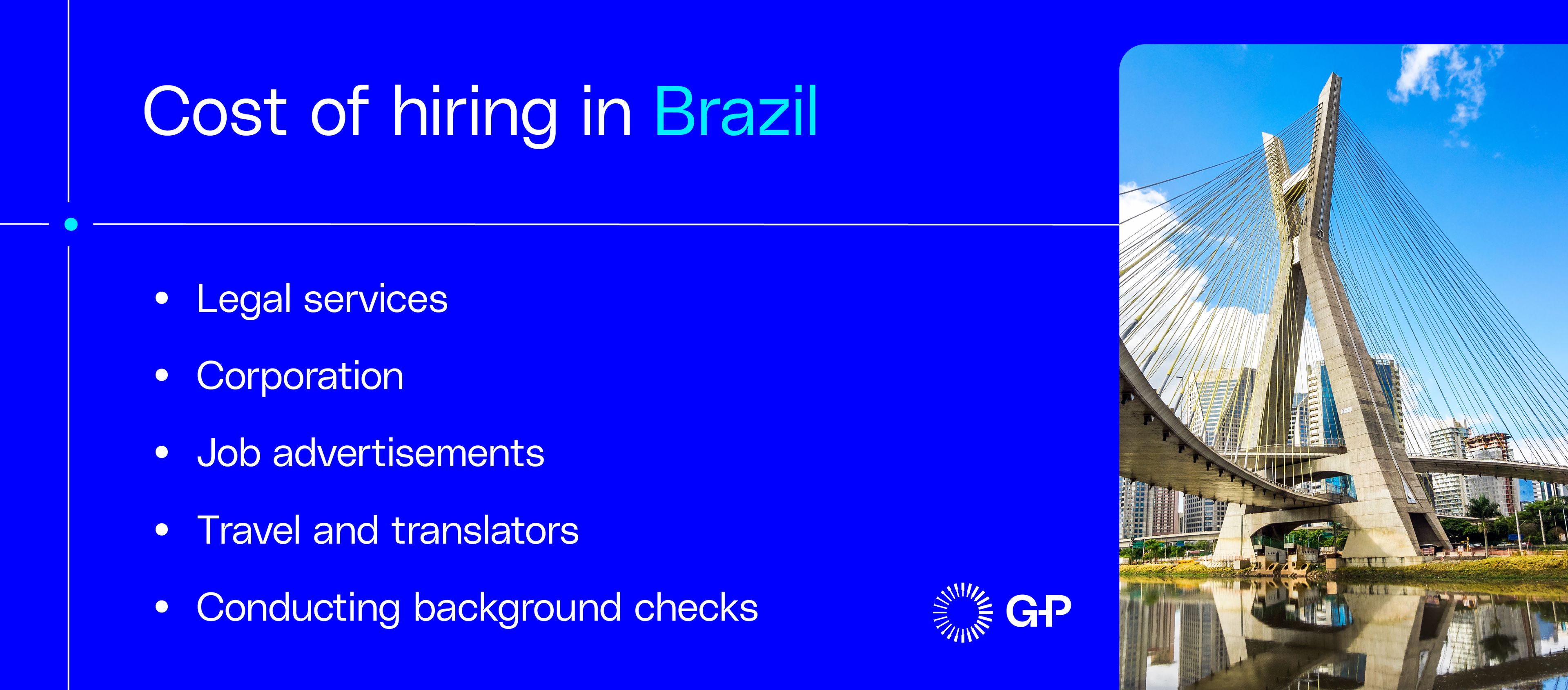Brazil is the largest country in South America by both land area and population (218M). It’s the tenth largest economy in the world. The Consolidation of Labor Laws (CLT) governs Brazil's employment laws. The CLT outlines mandatory benefits like the 13th-month salary, paid vacations, and strict rules on termination and overtime.
Before expanding into Brazil, you’ll need to understand contracts, taxes, wages, benefits, and other employment laws. Our guide will tell you everything you need to know about hiring in Brazil.
What to know before hiring in Brazil

If you’re expanding your business into Brazil for the first time, there are important legal requirements to be aware of. These norms and laws influence hiring practices in Brazil and many aspects of the employer-employee relationship, including compensation and benefits.
G-P Gia™, our AI-powered global HR agent, can answer your toughest compliance questions across 50 countries — including Brazil — and all 50 U.S. states. Reduce your reliance on outside counsel and cut the time and cost of compliance by up to 95% with Gia.
Here are five things to know about hiring in Brazil.
1. Employee-centric regulations in Brazil
Brazil’s employment laws strongly favor employees. Workers get a wide range of statutory rights and benefits, including paid leave, anti-discrimination protections, and severance entitlements. These are greater than those in other countries.
Employee termination in Brazil is highly regulated. Dismissals, especially those without cause, need strict adherence to notice periods, severance payments, and documentation. The risk of post-termination lawsuits is high.
Written employment contracts aren’t legally required for all employment relationships, but strongly recommended. Verbal contracts are valid under the CLT.
2. Languages in Brazil
Portuguese is the official language and is spoken by over 99% of the population. Brazil is the only Portuguese-speaking nation in the Americas. With the growth of Mercosur (the Southern Common Market) and increased trade, the economic necessity of Spanish has grown in schools and businesses. As with most countries, you’re more likely to hear English in city centers in Brazil than in other parts of the country, but English is not widely spoken.
3. Working hours and compensation in Brazil
The legal maximum workweek is 44 hours. This is spread across eight hours per day, Monday through Friday, and four hours on Saturday, or as agreed in collective bargaining agreements (CBAs). Employees get a minimum one-hour lunch break if they work more than six continuous hours. Alternative schedules are allowed if established by a CBA or written agreement.
Overtime is paid at a minimum of 150% for hours worked beyond the standard daily or weekly limits (Monday to Saturday). Work performed on Sundays or public holidays has to be paid at 200%, unless a compensatory day off is provided. CBAs can set higher overtime rates.
The minimum wage in Brazil is RD 1,518.00 per month. Some states, like São Paulo, have higher regional minimum wages, and employers have to pay the higher applicable rate. The minimum wage is adjusted annually based on inflation and GDP growth.
While not a statutory requirement, annual salary adjustments are common due to union negotiations and inflation.
The 13th-month salary is a mandatory annual bonus. It’s equal to one month’s salary, paid in two installments (by November 30 and December 20). It’s calculated as 1/12 of the monthly salary for each month worked in the calendar year. Commissions and certain bonuses can be included if they’re part of regular compensation.
4. Vacation and sick leave in Brazil
Annual leave requirements are generous in Brazil compared to other countries. After one year of service, employees get 30 days of vacation leave. Employees can divide their vacation time into three periods: one lasting at least 14 days, and two more lasting at least 5 days. Employees have the option to cash in up to 10 vacation days. These vacation days are paid, and employers have to pay a vacation bonus equal to one-third of the employee’s monthly salary.
Employees in Brazil also get paid sick leave. When an employee misses work due to a medical issue, employers have to pay them for their first 15 days of sickness, as long as the employee provides a doctor’s note. If the employee misses more than 15 days due to their medical condition, then the National Institute of Social Security (INSS) will take over.
5. Required benefits in Brazil
Brazil has generous statutory benefits, including paid vacation, 13th-month salary, social security (INSS), the severance fund (FGTS), and mandatory meal and transportation vouchers.
Employers have to withhold a portion of employees’ pay for INSS and make an employer contribution. The employer’s rate is typically 20% of payroll, plus extra contributions for workplace accident insurance and third-party entities, which can add 5.8% or more, depending on the company’s risk profile and sector.
Employee INSS contributions are withheld at progressive rates (7.5–14% in 2025) based on salary.
Meal vouchers and food vouchers aren’t required by federal law, but can be mandated by Collective Bargaining Agreements (CBAs) or are customary in many sectors.
Employers have to deposit 8% of the employee’s monthly salary into the FGTS account. This isn’t withheld from the employee’s pay; it’s an extra employer cost. FGTS is available to employees upon termination without cause, retirement, or in other circumstances like serious illness or home purchase.
Top hiring hubs in Brazil
Some cities in Brazil are known for particular industries. Knowing what each city has to offer allows you to focus your hiring efforts in the right place and fill roles faster.
The top talent hubs in Brazil are:
-
São Paulo is Brazil’s largest city and the main business, financial, and technology center. It hosts multinational companies and startups, making it the top hiring hub for a wide range of industries.
-
Rio de Janeiro is known for its energy, oil and gas, tourism, and creative industries. The city is a major employment center, especially for roles in engineering, media, and services.
-
Belo Horizonte is a hub for mining, technology, and business services, with a growing startup ecosystem.
-
Brasília is the nation’s capital. Brasília is the center for government, public administration, and related services, attracting talent in law, policy, and administration.
-
Curitiba is known for its advanced manufacturing, automotive, and technology sectors, as well as its reputation for urban planning and sustainability.
Key industries in Brazil
Understanding Brazil’s top industries allows you to benchmark salaries and benefits. You can use this insight to make smart choices about where to invest and grow your talent pool.
The top industries in Brazil include:
-
Financial services: Brazil has one of the largest financial markets in Latin America. This includes major commercial banks, investment firms, and the B3 (Brazil, Bolsa, Balcão) stock exchange, located in São Paulo.
-
Technology and digitalization: Brazil is a hub for technology in Latin America, with a growing startup ecosystem and many unicorn companies. This includes areas like fintech, proptech, and edtech.
-
Manufacturing: Brazil is a leading industrial nation globally. Areas include automotive (manufacturing and assembly of cars, trucks, and auto parts), aerospace (home to Embraer, one of the world's largest commercial jet manufacturers), and chemicals and petrochemicals (processing crude oil and natural gas).
-
Energy, oil, and gas: Brazil is a global producer of oil, thanks to large offshore pre-salt reserves. The state-owned company Petrobras is a big force in this sector. Brazil is a global leader in renewable energy, with over 80% of its electricity generation coming from renewable sources, primarily hydroelectric.
-
Agriculture: Brazil is important in global food security and commodity markets. Brazil is the world's largest producer of soybeans, coffee, and sugarcane. The country is also a big producer of corn, beef, and chicken.
The cost of hiring an employee in Brazil

Whether you’re hiring one employee or an entire team in Brazil, expenses are inevitable. Budget for the following:
-
Setting up an entity (unless you partner with an employer of record)
-
Advertising job positions
-
Paying referral bonuses to employees with connections in Brazil
-
Paying an in-house hiring committee
-
Traveling to and from Brazil, including hotel stays, meals, and transportation
-
Using a background check service for screening candidates
-
Drafting compliant employment contracts, legal review, and consultation with HR and legal experts
-
Costs for providing computers, phones, and software licenses
-
Expenses for onboarding materials and initial training
-
Mandatory employer contributions
-
Costs for maintaining required tax and payroll records and documentation
According to G-P Verified Sources from Gia, the employer burden rate in Brazil, which includes costs triggered on top of salaries, ranges from 60–100%, excluding accident insurance that can vary.
What does a company need to hire employees in Brazil?
Make sure you cover these essentials before expanding your team in Brazil:
-
Incorporate your company in Brazil.
-
Register your company name with the Board of Trade in the state where your business will operate.
-
Register with the federal revenue service to get a tax ID.
-
Register with the relevant state tax authority and get a state tax registration.
-
Register with the local municipality for an operating license.
-
Open a local bank account.
-
Register with the INSS for social security contributions.
-
Register with the severance indemnity fund (FGTS) system.
-
Register with the Ministry of Labor and Employment to report new hires.
-
Set up a compliant payroll system that calculates and withholds all statutory deductions.
-
Make sure the system is integrated with eSocial.
-
Draft employment contracts in Portuguese.
-
Set up processes to provide required benefits.
-
Register with the occupational health and safety authorities.
-
Keep accurate records of employment contracts, payroll, time tracking, and all labor-related documents.
Setting up a subsidiary in Brazil can take weeks or months. Use G-P EOR to hire full-time employees in Brazil without setting up your own entity. Build your team at a lower cost and with peace of mind that you’re doing so compliantly.
The steps to hiring in Brazil
The hiring process in Brazil is similar to the one you’re likely familiar with in your own country. The hiring process follows five basic steps: advertising the job, evaluating applications, interviewing candidates, sending job offers, and onboarding new employees.
1. Advertising job vacancies in Brazil
Create a detailed job description, including required qualifications, responsibilities, and benefits. Internships aren’t considered employment under the CLT. Job ads for internships must clearly identify the position as an internship and meet all legal requirements for such roles.
LinkedIn, Catho, InfoJobs, and Vagas.com are popular job sites in Brazil.
2. Evaluating applications in Brazil
Collect applications and review resumes. Screen applications and conduct interviews in compliance with local laws.
3. Interviewing candidates in Brazil
Interview candidates who made it onto your shortlist. You can do these interviews in person or virtually. Verify references and, if relevant, conduct background checks in compliance with Brazilian data protection laws (LGPD).
Gia can help you create questions that follow anti-discrimination laws in Brazil, so you can find the best fit for the role while complying with local regulations.
4. Making job offers in Brazil
Contact your chosen candidate to offer them a position with your company. Offers are typically made in writing. Draft an employment contract in Portuguese, including all mandatory clauses and statutory benefits. Both parties must sign the contract.
5. Onboarding new employees in Brazil
Now you can onboard new employees. Register your new hire with eSocial, INSS, and FGTS. Update the employee’s digital work card.
If you’re working with an EOR like G-P™, you won’t have to worry about the administrative burden of onboarding. We’ll streamline the process, so you can focus on training your new hire and integrating them into your company culture.
Hiring contractors in Brazil
Working with independent contractors in Brazil can be a cost-effective way to test the market and build a presence without the commitment of full-time employees. Contractors based in Brazil understand local consumer behavior, rules, and business practices. They’ll be ready to start working quickly with their own equipment and established work processes.
Hiring contractors allows you to easily adjust your talent pool based on your business needs, without the complexities and costs of employment.
Before you enter an agreement with an independent contractor in Brazil, consider the following:
1. Employees vs. independent contractors in Brazil
It’s important to understand the difference between employees and independent contractors. In Brazil, employers hire employees to do work and, in return, pay them a regular salary and benefits. Independent contractors provide services. Unlike employees, contractors set their schedules, use their own equipment, and work on specific projects, rather than having an ongoing role.
2. Penalties for misclassification in Brazil
Classifying someone as a contractor when they’re not can lead to severe penalties. If misclassification occurs, you’ll have to:
-
Retroactively pay all statutory employment rights and benefits.
-
Face administrative fines for failing to register employees, non-payment of social charges, and other violations.
-
Back pay social security (INSS) and FGTS contributions, plus interest and monetary correction.
3. How to pay contractors in Brazil
G-P Contractor™ takes away the messy, time-consuming process of hiring and paying international contractors. You can create and issue contracts and pay contractors with just a few clicks, all while ensuring a compliant process.
Our SaaS and AI-powered products – EOR, Contractor, and Gia – support companies as they build and manage global teams.
G-P is the recognized leader in global employment with more than a decade of experience, the largest team of HR, legal, and compliance experts, and a global proprietary knowledge base.
Make your expansion to Brazil easier with G-P. Contact us or book a demo today.





















